CIA Sponsored Terror, Civil Liberties, Human Rights, NSA Spying, Surveillance, Truth to Power
Podcast: Play in new window | Download
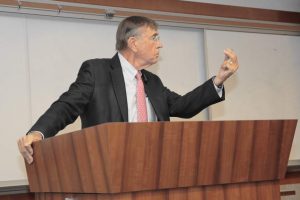
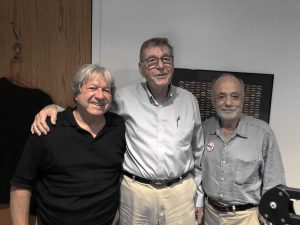
Michael E. Tigar On Challenges Lawyers Currently Face
Recently on Law And Disorder we interviewed Baher Azmy, Legal Director at the Center for Constitutional Rights, and National Lawyers Guild President Natasha Bannan. We were interested in their views of the challenges facing leftist lawyers and their movement clients face in these difficult times.
Attorney Jim Lafferty, the former head of the Los Angeles chapter of the National Lawyers Guild, who has a program on our sister station in Los Angeles, KPFK, joins me in the studio to cohost. We are going to speak for the entire hour with human rights attorney Michael Tigar.
Since the attacks on September 11, 2001, our democracy, however restricted at the time, has been even further shrunk by the growth of the national security state and the all knowing surveillance apparatus that has been set up. Moreover, the President, as the head of the executive branch of the government, has gathered unto to himself an unprecedented amount of power over the judicial and the legislative branches of the government. tigarbytes.blogspot.com/
Guest – Michael Tigar, emeritus professor of law at Duke University and at Washington College of Law. He has been a lawyer working on social change issues since the 1960s. He has argued numerous cases in United States Supreme Court and many Circuit Courts of Appeal. His books include “Law and the Rise of Capitalism”, “ Fighting Injustice ”, and the forthcoming Mythologist of State and Monopoly Power.“
———————

———————
CIA Sponsored Terror, Civil Liberties, Criminalizing Dissent, FBI Intrusion, Human Rights, Iraq War, NSA Spying, Political Prisoner, Prison Industry, Surveillance, Targeting Muslims, Torture, Truth to Power, War Resister
Podcast: Play in new window | Download
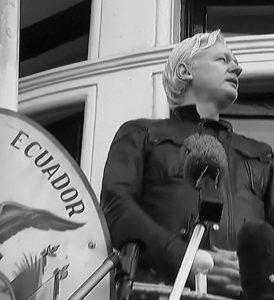
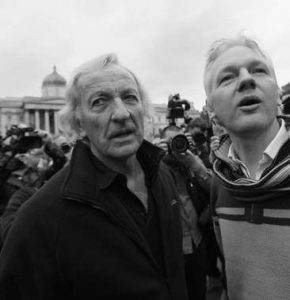
Mass Support Needed For Julian Assange
Two weeks ago, WikiLeaks founder and internet publisher Julian Assange , who is holed up in the Ecuadorian embassy in London, had his Internet access cut off due to pressure by the British and American governments on Ecuador. Ecuador had granted him political asylum in their embassy where he has been living in two small sunless rooms for five years. Ecuador gave him political asylum after he sought refuge in the embassy to avoid extradition to Sweden, which would have sent him to the US. Assange was under protracted investigation for a rape claim, made up by the Swedish police and Swedish prosecutor and denied by the purported women victim. Sweden finally dropped the case, but Assange remains subject to arrest in Britain jumping bail.
Assange and WikiLeaks had been steadily revealing the war crimes and illegalities of the American government since it first published the Iraq war logs eight years ago. The war logs included video footage of American soldiers assassinating Iraqi civilians and a Reuters journalist. Chelsea Manning, who was recently released after seven years in prison, furnished WikiLeaks with the war logs.
The United States government is seeking to capture Assange and bring him back to the United States to stand trial for espionage, a crime which carries the death penalty.
Guest – John Pilger, an Australian-British journalist based in London. John has worked in many facets of journalism, including a correspondent in the Vietnam War, the Middle East Desk for Reuters in London, a documentary film maker, and a producer for the Independent Television Network in London. Pilger is known for his conscience, bravery and acute historical insight. His articles appear worldwide in newspapers such as the Guardian, the Independent, the New York Times, the Los Angeles Times.
—-


You Thought We Wouldn’t Notice: Intellectual Property
Laws protecting artwork and intellectual property are increasingly being put to the test amid claims from rising artists marketing their work online whose work is being copied by others.
Art piracy can include music posters, clothing design, book cover art, signage, record sleeve art, and typography. Under copyright law, one artist using another artist’s idea is generally legal, while one artist using another’s expression of that idea is generally illegal. Only a fact-intensive analysis can provide a bit of clarity, and even that is subject to a judge’s or jury’s review.
Sometimes copyright cases expand into major litigation. A New York judge recently ruled that graffiti, or aerosol artists, were entitled to a $6.7 million verdict after New York developer Gerald Wolkoff destroyed their well-known public work. The claim in the so-called FivePointz case arose under the Visual Artists’ Rights Act, or VARA. It’s the kind of case that attorney Scott Burroughs says rarely goes to trial. Several artists created aerosol art pieces on the walls of an abandoned development in the once downtrodden and now gentrified neighborhood of Long Island City, Queens. Wolkoff destroyed their art as part of a development plan. Read Scott’s Column Above The Law.
Guest – Attorney Scott Burroughs, an advocate for artists’ rights who curates the art law blog You Thought We Wouldn’t Notice and has a weekly copyright law column on legal website Above the Law.
———————————————-

CIA Sponsored Terror, Civil Liberties, Human Rights, NSA Spying, Political Prisoner, Surveillance, Truth to Power
Podcast: Play in new window | Download
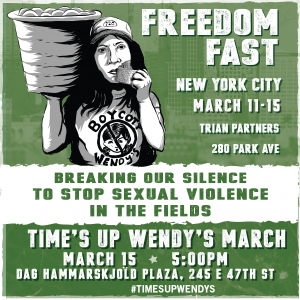
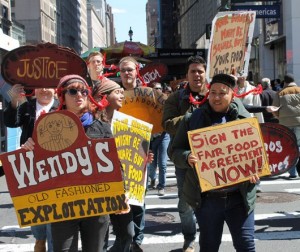
The Freedom Fast and Time’s Up Wendy’s March
Immokalee, Florida was the site of some of the most brutal human rights atrocities in the United States. One third of all the nation’s tomatoes are grown there. Since 1997, the Justice Department has prosecuted seven slavery cases in Florida, four involving tomato harvesters. More than 1,200 persons have been freed from agricultural slavery rings in Florida during the last 10 to 15 years.
Workers report brutal beatings, being shackled in chains at night, not receiving regular pay, and having to share small quarters with dozens of others in a mobile home for $200.00 a month. They work without breaks, in the beating sun for 10 to 12 hours a day, seven days a week.
In 1993 a small group of workers who had been meeting in a church founded the Coalition of Immokalee Workers. Their mission was to improve the lives of tomato pickers in Southern Florida. After years of organizing in Immokalee, the Coalition launched its first boycott of a national of a fast food company—Taco Bell—in 2001. Four years later, the company agreed to support wage increases and workplace protections for tomato pickers. Since then, food corporations, including McDonald’s, Burger King, Whole Foods, Subway, and Walmart have followed suit. Today, 14 of the world’s largest food retailers and restaurants have signed fair food agreements with the CIW.
In May the Coalition will receive the Abraham Lincoln Brigade Archives and/Puffin Award for Human Rights Activism for their continued efforts to protect the rights of agricultural workers, prevent involuntary servitude, and create a food supply chain that is fair from bottom to top.
Guest – Lupe Gonzalo is a senior staff member and leader of the Coalition of Immokalee Workers (CIW). She has worked in the agricultural fields of the United States for the last 12 years as a migrant farmworker, including in the harvesting of tomatoes, citrus, peppers, and many other vegetables and fruits. As part of the Fair Food Program education team, Lupe and her colleagues conduct workers’ rights education in seven states along the East Coast throughout the year
Guest – Patricia Cipollitti, Patricia organizes alongside faith communities as part of her staff role within the Alliance for Fair Food. The Alliance for Fair Food is a national network of people working in partnership with the Coalition of Immokalee Workers for farmworker justice.
—-
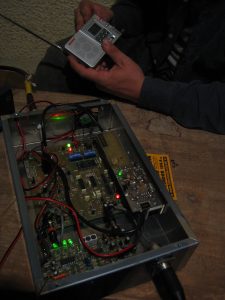
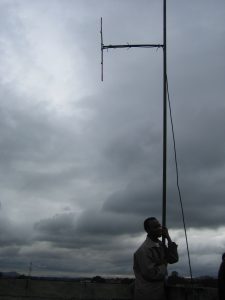
The Prometheus Radio Project And LPFM
Where do you turn on your radio dial to hear diverse viewpoints, community voices, or even local musicians? If you’re like thousands across the country you might tune into Low Power FM or LPFM noncommercial broadcast stations. They operate at a lower transmission power and serve smaller areas than full power stations.
In 1999, the Federal Communications Commission launched the low power FM radio service, opening up an opportunity for community radio broadcasting in more than two decades. LPFM’s broadcast from 10 to 100 watts and are run by non-profit organizations, unions, schools, churches, and other local, non-commercial organizations. Today there are more than 800 low power radio stations on the air, committing to giving 8 hours a day of air time to local voices.
Law and Disorder is thrilled to be carried on several LPFM stations but it hasn’t been an easy road. Early on, corporate sponsored big broadcasters have pushed Congress to limit low power radio as soon as it started. Fortunately, The Prometheus Radio Project fought for years to support the Local Community Radio Act that would return authority to the FCC, and allow them to license low power stations in cities for the first time.
Guest – Paul Bane got hooked on Grassroots Radio by listening to Boulder’s KGNU in the mid 90’s. That also led him into activism for global economic dignity in the “Seattle-era” street movement. Along the way he also stood against police brutality, for an end of racism toward Native Americans and others, an end of media bias including that at NPR, of discrimination and dehumanization aimed at women, LGBT, and undocumented immigrants. When he co-founded Grassroots Radio station KRFC between 1997 and 2003, he also co-founded its news collective. After chatting with Prometheus at Grassroots Radio Coalition conferences for a decade or so and leaving his Fortune 100 R&D job, Paul volunteered at Prometheus in 2010 and is currently our nerdiest engineer. His electrical engineering degree and ham radio experience comes in handy for FCC application engineering, station design, construction and troubleshooting. Paul also created and maintains the free-to-use RFree software to make application engineering easier.
—————————————————
CIA Sponsored Terror, Civil Liberties, Criminalizing Dissent, FBI Intrusion, Human Rights, NSA Spying, Political Prisoner, Prison Industry, Surveillance, Targeting Muslims, Truth to Power, War Resister
Podcast: Play in new window | Download
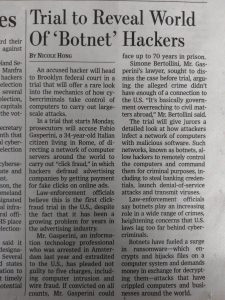
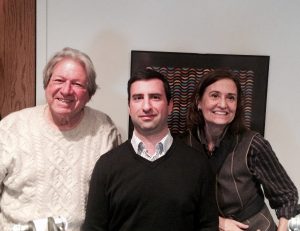
Attorney Prevails Against CFAA Charges In Click Fraud Trial
In a trial that was closely watched by cybersecurity experts, Italian citizen Fabio Gasperini was charged for allegedly violating the Computer Fraud and Abuse Act, or CFAA. Computer experts claimed it was the first so-called “click fraud” trial and would test the U.S. government’s ability to link individuals to complex cybercrimes.
As covered before on Law and Disorder, the CFAA is an antiquated law passed in 1986 before personal computers and smart devices were omnipresent in all aspects of our lives. It affords law enforcement extremely wide latitude to prosecute virtually any computer-related activity, including violations of Terms of Service agreements. Each offense can bring up to 20 years in prison, and when multiple counts are charged individuals can face decades behind bars.
In 2017 Simone Bertollini became the first known attorney to prevail against CFAA charges. His 34-year-old client, Mr. Gasperini, was found not guilty on several felony counts of wire fraud, computer intrusion and money laundering for which he faced 70 years in prison; he was convicted on only one count of computer intrusion, a misdemeanor, which is current being appealed. Mr. Bertollini disputed prosecutors’ version of events and noted that none of the expert witnesses had ever seen the botnet that Gasperini allegedly used. He also questioned how he could be charged with conspiracy when no conspirators were named or charged. Cross Examination Transcript
Guest – Attorney Simone Bertollini – After graduating from law school in Rome, Italy, Simone moved to the United States where he graduated with a Juris Doctor degree, becoming one of the very few Italian lawyers in New York with full academic qualifications in both Italy and the United States. Simone first came to the United States with an F-1 student Visa to attend law school. After, he started his own legal practice, and obtained E-2 Treaty Investor Visa status. Later, Simone became a Lawful Permanent Resident, and now he is a proud American citizen. In the course of his career, Simone handled hundreds of immigration cases, including removal proceedings and federal appellate matters. Simone has also substantial criminal jury trial experience.
—-
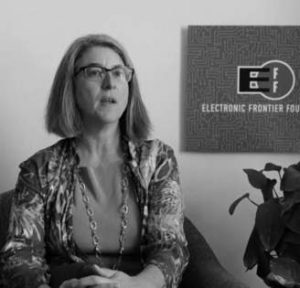
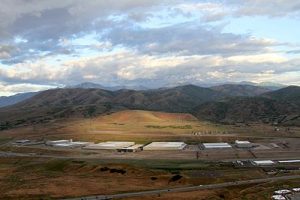
Electronic Frontier Foundation on NSA Spying Extension
A few weeks ago the U.S. Congress voted to pass a bill extending, for another six years, the NSA’s practice of Internet surveillance. Cindy Cohn, executive director of the Electronic Frontier Foundation, called this “a significant blow against the basic human right to read, write, learn, and associate free of government’s prying eyes.” The vote happened without public debate on a matter of great public concern.
The legislation in question allowing warrantless surveillance is Section 702 of the FISA Amendments Act. The Act is intended to target foreigners abroad. In practice it puts a great deal of our internet activities to government scrutiny, as they pass through key internet checkpoints, and as they are stored by providers like Google and Facebook. The NSA is thus able to gather and store private communications of countless non-suspect Americans.
Guest – Cindy Cohn, Executive Director of the Electronic Frontier Foundation. From 2000-2015 she served as EFF’s Legal Director as well as its General Counsel. Ms. Cohn first became involved with EFF in 1993, when EFF asked her to serve as the outside lead attorney in Bernstein v. Dept. of Justice, the successful First Amendment challenge to the U.S. export restrictions on cryptography.
——————————-
CIA Sponsored Terror, Civil Liberties, Criminalizing Dissent, Habeas Corpus, Human Rights, Military Tribunal, NSA Spying, Political Prisoner, Prison Industry, Prosecution of the Bush Administration, Supreme Court, Surveillance, Targeting Muslims, Truth to Power, War Resister
Podcast: Play in new window | Download


Will the 911 Case Finally Go To Trial?
Sixteen years have passed since the 911 attacks. The truth of who was behind the attacks has come out in a class action lawsuit brought by more than 6500 victims and survivors. The lawsuit alleges that it was elements of the Saudi Arabian government that attacked us on 9/11. The Defendant in the lawsuit is Saudi Arabia.
The Saudi Arabian government hired 15 public relations firms to help them deny responsibility. They hired several Washington white shoe high powered connected law firms. They hid behind the law of sovereign immunity, which had to be overturned by an act of Congress in order for the lawsuit to proceed. They were helped by the US government in the cover-up by the Bush and Obama administrations. But after 16 years the case is now proceeding rapidly through the Federal courts and will either be settled or tried. The object of the lawsuit is to obtain money explained Sharon Pemboli, one of the plaintiffs and leaders of a group of women from New Jersey known as “the Jersey girls” who lobbied to win passage of the law which made the lawsuit possible. She believes that if the Saudi Arabian government is deprived of funds it will not be able to fund Al Qaeda and the extremist Wahhabi clergy responsible for supporting the terrorism of Al Qaeda.
The American public has been led to believe mistakenly that Saddam Hussein and Iraq were behind 911. The attack on Iraq was a war of aggression. At the end of World War II the United States set up the Nuremberg trials to try Nazi war criminals. They wanted to set forth principles that were not merely victor’s justice. At the Nuremberg trials the Germans were found guilty of starting a war of aggression, which was called the greatest of all crimes because it has contained within it all other crimes.
Guest – Andrew Cockburn, the Washington editor of Harper’s magazine. He has written an extremely important article in the October issue titled Crime and Punishment: Will the 9/11 Case Finally Go To Trial? about the class-action law suit brought by the victims of 9/11 against the government of Saudi Arabia.
—-


U.S. Magdalene Laundries and the Indiana Women’s Prison Researchers
From the 18th to early 20th centuries Catholic institutions known as the Magdalene Laundries in Ireland effectively enslaved unmarried mothers, where infants and mothers were subjected to brutal conditions and died in the hundreds. In 1993, a mass grave containing 155 corpses was uncovered in the convent grounds of one of the laundries. This led to media revelations about the operations of the secretive institutions Investigations into these homes have brought apologies and official compensation by the state of Ireland.
Few realize, however, that these homes also existed in the United States. Reports of the inhumane conditions in these homes has encouraged survivors of U.S. Magdalene Laundries to share their own their experiences. Surprisingly, few religious leaders, journalists and historians have yet to address and speak out about this chapter in our history.
That is, until scholars at the Indiana Women’s Prison began to research Magdalene Laundries, and their impact on girls and young women of all faiths across the United States for over 100 years. They believe that these homes were in effect the first prisons for women in the nation. And their work is being published and helping to spark a national discussion.
In a law review article that they published in the Journal of the Indiana Academy of the Social Sciences, the researchers note that their discovery of the laundries and their role in confining women is ‘stark evidence of historical amnesia.They say that the laundries played an important role in shaping attitudes toward female sexuality, identity, and societal reintegration.
Guest – Kelsey Kauffman, in 2012 she and two friends started a small college program at the Indiana Women’s Prison that has grown to 14 teachers and 80 students. She has worked as a prison officer and has taught in three prisons. Her research, which has taken her to more than 80 prisons on four continents, focuses primarily on the impact prison employment has on officers.
——————————————
Civil Liberties, Criminalizing Dissent, Human Rights, NSA Spying, Prison Industry, Supreme Court, Targeting Muslims, Torture, War Resister
Podcast: Play in new window | Download
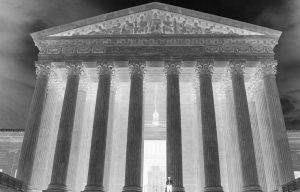

CCR: Current Supreme Court Dockets
We are currently living through an attack on every aspect of American democracy. This phenomena predated the Trump presidency and has been qualitatively accelerated by it.
This across-the-board constriction of the power and rule of the American people, to the extent that it had existed, has encompassed the suppression of voting rights; an attack on public education; the growth of enormous income inequality; the unimpeded influence of money in elections; the threat and constriction of the right of women to control their own bodies; the attack on peoples’ rights to build and join effective unions; the refusal to close the offshore prison of Guantánamo and the refusal to prosecute illegal torturers; the attack and net neutrality and access to the internet; the increase by the state of the surveillance of American citizens; the militarization of the police; encouragement of racism; the banning of Muslims; suppression of the right to demonstrate; and the growth in executive authority.
Guest – Attorney Baher Azmy, the Legal Director of the Center for Constitutional Rights. The CCR was founded in 1966 to advance the goals of the civil rights movement. Michael Ratner, our co-host and founder of Law And Disorder Radio, was its president emeritus at the time of his passing in May of last year.
—-
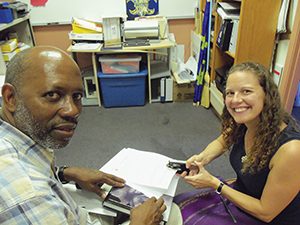

Lawyers You’ll Like: Alison McCrary
As part of our Lawyers You’ll Like series, today we are joined by Alison McCrary. Alison is a social justice attorney, a Catholic nun, president of the Louisiana Chapter of the National Lawyers Guild, and a Spiritual Advisor on Louisiana’s death row. She is the former Program Director for the Community-Police Mediation at the New Orleans Office of the Independent Police Monitor where she created a national model for improving community-police relationships, taught at the New Orleans Police Academy, and helped develop similar programs in cities across the nation.
As a 2010 Soros Justice Advocacy Fellowship in New Orleans, Alison challenged and helped reform policing practices and policies to transform relationships between police officers and the bearers of New Orleans’ indigenous cultural traditions. Alison has served as a National Lawyers Guild legal observer trainer and the New Orleans Legal Observer® Program Coordinator.
Before law school, she worked at the Capital Post-Conviction Project of Louisiana providing litigation support on death penalty cases and at the United Nations in New York monitoring the implementation of U.N. Security Council Resolutions.
Guest – Attorney Alison McCrary. In New Orleans, Alison worked, clerked, and/or volunteered at Southeast Louisiana Legal Services, the Louisiana Voters’ Rights Network, Equity and Inclusion Campaign for the Louisiana Disaster Recovery Foundation, Orleans Parish Public Defenders Office, Louisiana’s Fourth Circuit Court of Appeals, and Loyola University’s Community Justice Clinic. Nationally, Alison coordinates and provides legal support for social justice movements such as the School of the Americas Watch. She received her J.D. from Loyola University’s College of Law in New Orleans and her B.A. in English at Georgia State University in Atlanta.
————————————–






















